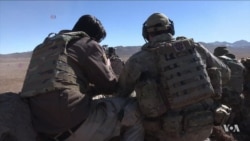NATO leaders are going to Brussels for a summit meeting on Thursday expecting to agree on key principles. With Monday's attack in Britain overshadowing the meeting, there will be quick consensus on the need to keep fighting terrorism both at home and abroad, in places like Afghanistan.
How to do it is a different question.
The war in Afghanistan is one of the key topics European leaders hope to learn more about when they meet with U.S. President Donald Trump.
The U.S. leader wants a boost in NATO contributions for the effort, but Germany’s Angela Merkel has indicated she is lukewarm about this and will wait for NATO discussions on the matter. “We are also coordinating the cooperation of about 20 member countries which are active there,” she said earlier this month.
“I am going to wait for the decisions. I do not think we're first in line to expand our capacities there,” Merkel said.
Pressing again for NATO members' payments
Aside from the Afghanistan war, Trump has made clear he wants alliance members to meet minimum contribution levels, and spend two percent of their gross national income on defense. Only five of the alliance’s 28 members - the United States, Britain, Estonia, Greece and Poland - are doing so.
European leaders expect to hear a reaffirmation that NATO’s anti-terrorism work extends beyond Europe and the Atlantic.
Former British Foreign Minister David Owen said NATO "is a vehicle for the world" already.
"Actually it is a global entity, and I think there is a case for expanding that now to dealing with ISIS," Owen told VOA. "I know this is controversial, but I think if it’s approached carefully and steadily, we will see NATO accepting that it is right for there to be an extension of the remit [authority] from Iraq to go out and to deal with ISIS, and I think it’s a much better way of American power being globally used within the framework of NATO.”
There are disagreements going into the meeting, but there is also the prospect of progress in some key areas.
Manchester attack highlights global war on terror
The global fight on terror is on the NATO summit agenda. In the wake of the Manchester attack, Britain’s Theresa May was expected to present a strong case in support of more coordination among allies to tackle terrorism, something analysts said would further bolster the view that NATO remains relevant and necessary.
Russia also looms large for European leaders at both the NATO summit and the G-7 meeting that follows in Italy.
Germany, Austria and others hope for a new direction in relations with Moscow following the Ukraine crisis, as continued sanctions against Moscow have created pressure on western European nations dependent on Russian energy exports.
European leaders also hope to use the NATO summit to ease tensions with Turkey following the recent referendum that gave President Recep Tayyip Erdogan sweeping new powers, and raised new concerns about growing authoritarianism.
Waiting for Trump...
A dispute between Turkey and Austria emerged on Tuesday when reports said the Turkish government has suspended cooperation with NATO members following Austrian opposition to Turkey’s membership in the EU. Austria is not a member of NATO but its troops sometimes partner with alliance forces.
The big hope among European leaders is that seeing Trump face to face and hearing him repeat assurances that he no longer believes NATO is obsolete will quell anxieties about the U.S. role as guarantor of Europe’s security.
Reports quote NATO sources as saying officials will hold off on issuing a formal declaration as is common after some summits. It may depend on what is said at the meeting. In this time of transition and surprises, that is something no one can predict.





